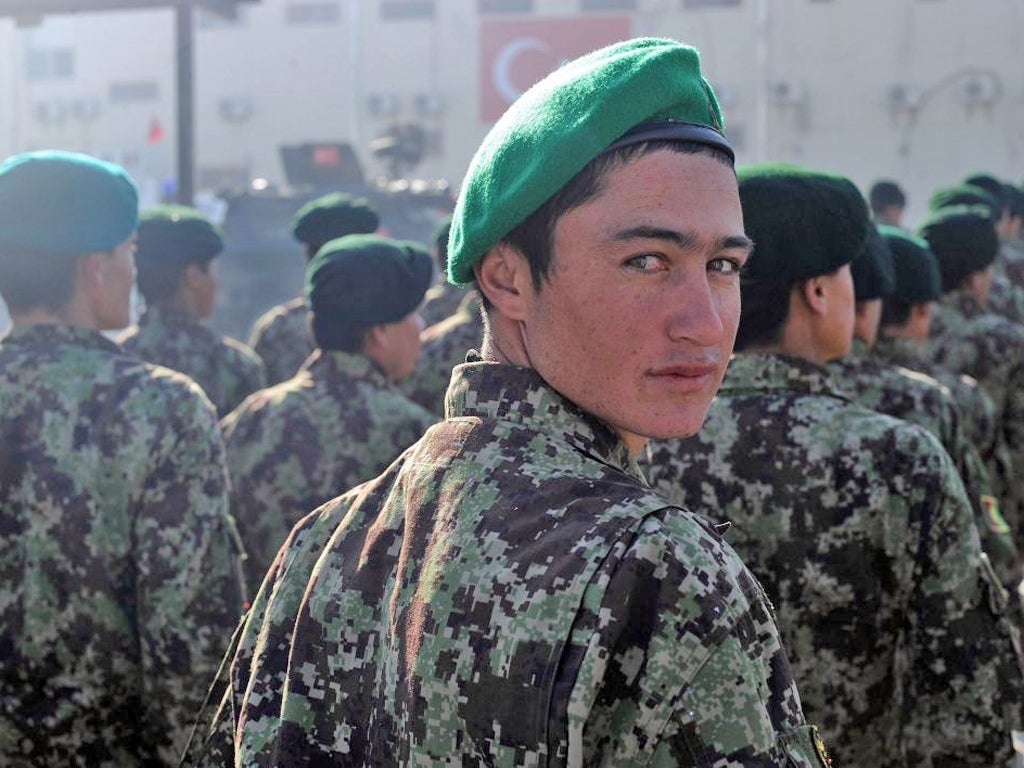Afghanistan 'will need billions in aid after troops leave'
Country could become terrorist haven again if the West does not maintain support, think tank warns

There is little prospect of a secure and safe Afghanistan until 2020 – six years after the 2014 deadline for troop withdrawal – according to a new report by one of the world's most respected think tanks. It warns the country is again in danger of becoming a haven for international terrorists.
Disaster will only be averted if the UK and others honour their commitment to support the Afghan government long after the soldiers have been brought home, the International Institute for Strategic Studies (ISS) report, Afghanistan: to 2015 and beyond, argues.
The report, released on Thursday, contradicts repeated assurances from Britain and the US that troop withdrawal in just three years' time is "on track" – claims based on the assumption that Afghanistan will then be ready to take on responsibility for its own security.
David Cameron is keen to end Britain's involvement in the decade-long conflict, which has seen more than 2,800 Nato deaths, including almost 400 British troops, and cost hundreds of billions of pounds.
Operation Enduring Freedom, as the US called the campaign, has driven the Taliban from power, killed Osama bin Laden and seen advances in women's rights, health and education.
However, the report warns that corruption, factional infighting, poverty and illiteracy all threaten the country's future potential. It adds that while more of the country is under government control, the fighting is far from over. Fighting in the east has intensified in recent months as insurgents take advantage of a concentration of coalition forces in the south. As a result, it cautions, eastern Afghanistan could become a recruiting ground for militants as well as "a base for international terrorist groups" – which is what prompted the 2001 invasion.
The assessment comes as the US turns its full military focus on Afghanistan, following its withdrawal from Iraq last Thursday.
However, a clean exit will not be easy, the report states. Violence remains at record levels. In August, the UN reported the average monthly number of incidents – including suicide attacks – was 2,108, up 39 per cent on the same period in 2010.
Other obstacles to overcome, says the report, include weaknesses in the Afghan army and police, a "shadow state" bankrolled by the drugs trade, and corruption "sanctioned from the highest levels of the Afghan state".
Future stability will depend on the coalition nations continuing to provide Afghanistan with billions in aid for years to come. According to British officials, the cost of maintaining the Afghan army and police after 2014 will be more than £5bn a year. The report stresses that to have any chance of success, the US and its allies must also continue to provide military and civilian training, and increase diplomatic efforts to maintain stability.
The report concludes that, "on the balance of probability, the country will not rapidly return to civil war". But it adds: "the country will remain poor, weak and unstable. Its politics will continue to be shaped by civil and military conflict."
Toby Dodge and Nicholas Redman, the study's co-editors, say the Afghan government has enough power to "impose a rough and ready control" but they conclude: "It will require extended oversight by the international community if Afghanistan is to avoid becoming once again a failed state and a platform for international terrorism."
State of the nation: Balance sheet after a decade of conflict
Education Despite Taliban attacks, more than seven times as many pupils (and 480 times as many girls) are now in primary or secondary school – 6.6m in 2009 compared to 910,000 in 2001. Poverty, forced marriage and lack of support force children to drop out. Adult literacy rates remain low, at 28 per cent.
Security forces Quality and corruption are the main issues. A shortfall of trainers – 1,000 posts are expected to be vacant by next March – is also a problem. Few units are thought capable of functioning without outside help.
Drugs The conflict has seen an explosion in drug production from close to zero under the Taliban to an industry that raises more than $100m a year in "taxes" levied by insurgents. Helmand province remains the biggest opium region, producing almost 2,000 tonnes in 2010, but growing areas have spread nationwide.
Victims The Afghans have paid the highest price for war. Civilian casualties rose from 1,523 in 2007 to 2,777 in 2010. While the majority are killed by insurgents, hundreds are killed by coalition forces each year, causing tensions with the Afghan government.
Democracy Elections have been tarnished by allegations of fraud and vote-rigging. Rumours persist that vote-buying is widespread.
Military casualties Annual deaths of coalition troops have soared from a handful in 2001, to a record high of more than 700 in 2010. Since 2001, 391 British soldiers have died.
Subscribe to Independent Premium to bookmark this article
Want to bookmark your favourite articles and stories to read or reference later? Start your Independent Premium subscription today.

Join our commenting forum
Join thought-provoking conversations, follow other Independent readers and see their replies